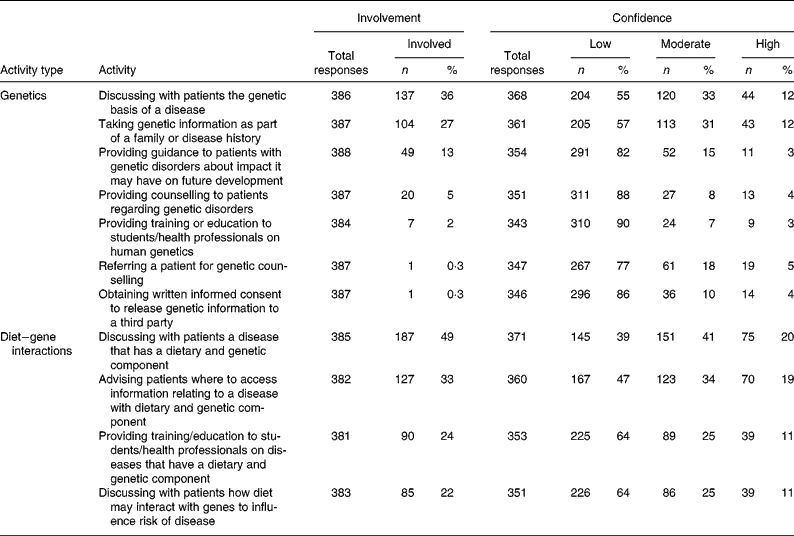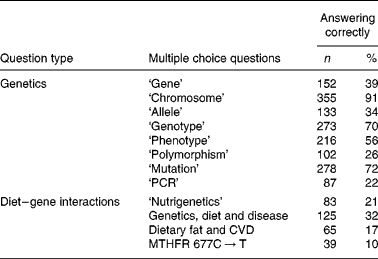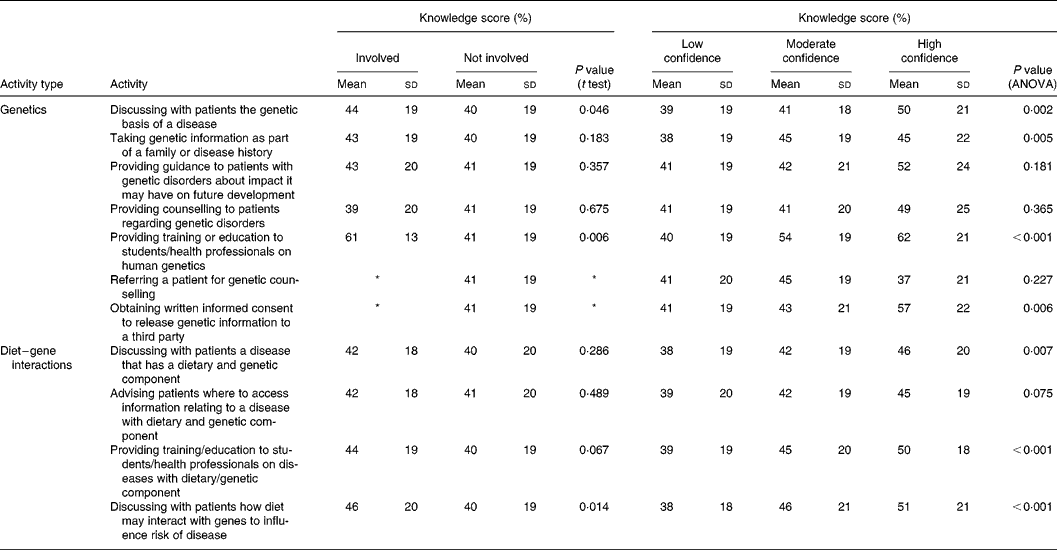Interactions between nutrients or food compounds and the genome have become the focus of much research in recent years. These diet–gene interactions include the impact of nutrients or food compounds on gene expression (nutrigenomics) and the impact of genetic variations on the response to nutrients or food compounds (nutrigenetics). For example, low-fat diets reduce plasma cholesterol concentrations most effectively in individuals carrying the apoE4 allele in the apoE geneReference Loktionov, Scollen, McKeown and Bingham1. Similarly, low folate status increases plasma homocysteine concentrations specifically in those with a common single nucleotide polymorphism in the methylenetetrahydrofolate reductase gene C677:TReference Jacques, Bostom, Williams, Ellison, Eckfeldt, Rosenbery, Selhub and Rozen2, Reference Devlin, Clarke, Birks, Evans and Halsted3.
Advances in our understanding of diet–gene interactions may eventually allow the transition from generic nutritional recommendations into an individualised nutrition prescriptionReference Arab4. For this potential to be realised, those involved in understanding and applying these advances, including dietitians, nutritionists and doctors, must be equipped with relevant knowledge and skills relating to genetics and diet–gene interactions.
Historically, the genetic competencies of dietitians have been limited to the nutritional management of relatively rare single-gene disorders (e.g. inherited metabolic diseases, cystic fibrosis)Reference Burton, Sanderson, Dixon, Hallam and White5. However, multi-factorial diseases (e.g. obesity, diabetes, cancer), which are increasingly prevalent and commonly involve nutritional prevention or management from a dietitian, have aetiologies that involve multiple genetic and environmental factors acting in concertReference Ordovas6, Reference Reszka, Wasowicz and Gromadzinska7. However, despite the requirement for dietitians to integrate an understanding of genetics and diet–gene interactions into their practice, studies in the USA have found this is not the caseReference Lapham, Kozma, Weiss, Benkendorf and Wilson8, Reference Rosen, Earthman, Marquart and Reicks9. For example, in the Human Genome Education Model (HuGEM) survey of 362 dietitians, there was widespread low involvement and confidence in a series of genetics-related activitiesReference Lapham, Kozma, Weiss, Benkendorf and Wilson8, whilst a survey of 995 dietitians indicated that the majority (60 %) had low confidence in their ability to apply nutrigenomics to their clinical practiceReference Rosen, Earthman, Marquart and Reicks9.
Studies in the UK have found significant gaps in genetics knowledge and skills within medicineReference Burke, Stone, Bedward, Thomas and Farndon10 and nursingReference Bankhead, Emery, Quereshi, Campbell, Austoker and Watson11. However, despite its importance in the delivery of effective nutritional management, there are no studies investigating the involvement, confidence and knowledge in genetics and diet–gene interactions of dietitians in the UK. A national postal survey was conducted for this purpose.
Materials and methods
Questionnaire
An anonymous national postal survey was conducted to measure dietitians' involvement, confidence and knowledge in genetics and diet–gene interactions. The questionnaire was composed of four sections to measure: (i) involvement in eleven activities relating to genetics (seven questions) and diet–gene interactions (four questions), which were adapted from the HuGEM surveyReference Lapham, Kozma, Weiss, Benkendorf and Wilson8 and were rated using a dichotomous response set; (ii) confidence in the same eleven activities, which were rated using a 5-point Likert scale (1, very low confidence; 5, very high confidence); (iii) knowledge using twelve multiple choice questions relating to genetics (eight questions) and diet–gene interactions (four questions); (iv) clinical experience using categorical scales and dichotomous response sets.
The content validity of the questionnaire was measured by survey of the clinical and academic dietitians involved in a national genetics workshop (n 4) and by a statistician with expertise in questionnaire design. All content experts agreed that the sections were ‘relevant’ or ‘very relevant’, although minor modifications were made to the questionnaire layout and the framing of questions. Construct validity of the knowledge section was demonstrated by comparison of the knowledge score of a convenience sample of dietitians (n 15) and doctorate level geneticists (n 9) (mean knowledge score 58 % v. 87 % respectively, P = 0·004). Intra-rater reliability was demonstrated by repeat completion of the questionnaire by the dietitians (n 15) after a 1-week interval, with agreement for all four sections ranging from 60–100 %.
Survey procedure
The questionnaire was sent to a total of 600 dietitians in order to reflect the sampling frame from the HuGEM study in the USAReference Lapham, Kozma, Weiss, Benkendorf and Wilson8. The list was generated at random from the membership database of the British Dietetic Association and reflected 12 % of the total membership. The inclusion criterion was dietitians based in the UK and the exclusion criteria were non-practising or retired dietitians. Approval to undertake the study was granted by both King's College London Research Ethics Committee and the NHS Eastern Multi-Centre Research Ethics Committee.
Coded questionnaires were mailed to the sampling frame. In order to mitigate non-responder bias and increase response rate, the anonymous questionnaire was short (two double-sided pages), printed on pink paper, sent with a personalised cover letter on university headed paper and with a stamped addressed envelope enclosedReference Edwards, Roberts, Clarke, DiGiuseppi, Pratap, Wentz and Kwan12. A second copy of the questionnaire and a revised cover letter was sent to non-responders at 1 month.
Data analysis
All data analysis was conducted using SPSS for Windows (version 13.0; SPSS Inc., Chicago, IL, USA). Frequency distributions were used to describe the level of involvement and confidence in the different activities. Due to the low frequencies of ‘very high confidence’, the scale was collapsed from five to three categories of ‘low’, ‘moderate’ and ‘high’ confidence, in order that comparison between sample sub-groups could be conducted using the χ2 test. Mean knowledge score (% of correct answers) on the twelve multiple choice questions was compared between sample sub-groups using independent samples t tests or one-way ANOVA, as appropriate. All tests were two-tailed and considered significant where P ≤ 0·05.
Results
Sample
A total of 404 questionnaires were returned (actual response rate 67 %); however, fourteen of these were excluded as they were returned blank, resulting in the inclusion of 390 questionnaires in the final analysis (valid response rate 65 %). The majority of dietitians responded to the first mailing (n 324, 83 %).
The respondents worked in a variety of settings (not mutually exclusive) including general or teaching hospitals (n 229, 59 %), community or public health (n 162, 42 %), self-employed (n 23, 6 %), industry (n 10, 3 %), academia (n 7, 2 %) or other (n 9, 2 %).
Of those respondents who were involved in direct patient management (n 337, 89 %), the most common patient groups they had worked with in the past year (not mutually exclusive) were diabetes (n 161, 48 %), obesity (n 140, 41 %), medical (n 123, 36 %), cardiovascular (n 97, 29 %) and gastroenterology (n 83, 25 %). A total of 67 (20 %) respondents worked in paediatrics.
Involvement and confidence
The majority of dietitians reported no involvement in each of the eleven activities relating to genetics and diet–gene interactions in the past year (Table 1).
Table 1 Involvement and confidence of dietitians in activities relating to genetics and diet–gene interactions*

* For details of subjects and procedures, see Materials and methods.
There was variation between the involvement in genetics activities and involvement in the diet–gene activities. For example, involvement in genetics activities ranged from 0·3 % (e.g. ‘referring a patient for genetic counselling’) to 36 % (‘discussing with patients the genetic basis of a disease’), whereas involvement in diet–gene activities ranged from 22 % (‘discussing with patients how diet may interact with genes to influence the risk of disease’) to 49 % (‘discussing with patients a disease that has a dietary and genetic component’).
The majority of dietitians reported ‘low’ confidence for each activity, except for ‘discussing with patients a disease that has a dietary and genetic component’ and ‘advising patients where to access information relating to a disease with a dietary and genetic component’ (Table 1).
As with involvement, there was variation between the confidence in genetics activities and confidence in the diet–gene activities (Table 1). For example, ‘high’ confidence in genetics activities ranged from 3 % (‘providing training or education to students/health professionals on human genetics’) to 12 % (‘discussing with patients the genetic basis of a disease’), whereas ‘high’ confidence in diet–gene activities ranged from 11 % (‘providing training/education to students/health professionals on diseases that have a dietary and genetic component’) to 20 % (‘discussing with patients a disease that has a dietary and genetic component’).
Respondents who were involved in an activity were more confident to undertake it than those who were not involved in that activity (P < 0·001). This was the case for all genetics and diet–gene activities, except for those with such low frequencies of involvement (n < 10) as to prevent comparative χ2 analysis.
Knowledge
The number (%) of respondents correctly answering each of the knowledge questions is provided in Table 2. In the genetics knowledge section, the proportion of correct answers ranged from 22 % correctly defining ‘PCR’ up to 91 % correctly defining ‘chromosome’. Half of dietitians responded ‘don't know’ to the definition of ‘polymorphism’.
Table 2 Dietitians' knowledge of genetics and diet–gene interactions (n 389)*

MTHFR, methylenetetrahydrofolate reductase.
* For details of subjects and procedures, see Materials and methods.
In the diet–gene knowledge section, there were low numbers of correct answers to each question, ranging from 10 % correctly identifying the effect of the methylenetetrahydrofolate reductase 677C:T mutation up to 32 % correctly identifying the potential impact of genetics on diet and disease (Table 2). Throughout most of this section dietitians used the ‘don't know’ response.
The mean total knowledge score was 41 (sd 19) %. Interestingly, the mean genetics knowledge score (51 (sd 22) %) was higher than the diet–gene knowledge score (20 (sd 23) %, P < 0·001).
Involvement, confidence and knowledge
The total knowledge score was compared between dietitians who were, and were not, involved in each genetic and each diet–gene activity (Table 3). Total knowledge score was higher for those who were involved in ‘discussing with patients the genetic basis of disease’ (44 (sd 19) % v. 40 (sd 19) %, P = 0·046), ‘providing training or education to students/health professionals on human genetics’ (61 (sd 13) % v. 41 (sd 19) %, P = 0·006) and ‘discussing with patients how diet may interact with genes to influence risk of disease’ (46 (sd 20) % v. 40 (sd 19) %, P = 0·014) than those who were not involved in these activities.
Table 3 Dietitians' knowledge score compared to involvement and confidence in activities relating to genetics and diet–gene interactions†
(Values are means and standard deviations)

* As there was only one, the means and standard deviations cannot be calculated and therefore a t test cannot be conducted.
† For details of subjects and procedures, see Materials and methods.
For four of the genetics activities and three of the diet–gene activities, dietitians who reported higher confidence had higher total knowledge scores (Table 3).
Discussion
A national questionnaire survey was undertaken to measure the involvement, confidence and knowledge in genetics and diet–gene interactions of dietitians in the UK. Although there was considerable variation amongst respondents, involvement and confidence in undertaking genetics activities and diet–gene activities was predominantly low. In addition, the knowledge score was generally poor with dietitians answering, on average, only 41 % of questions correctly.
The valid response rate (65 %) compares favourably with the HuGEM survey of health professionals' involvement and confidence in genetics (dietitians' response rate 62 %)Reference Lapham, Kozma, Weiss, Benkendorf and Wilson8 and a recent survey of dietitians' application of nutrigenomics in the USA (response rate 40 %)Reference Rosen, Earthman, Marquart and Reicks9.
Involvement and confidence
The low involvement of dietitians in genetics activities is perhaps not surprising and is concordant with previous studiesReference Lapham, Kozma, Weiss, Benkendorf and Wilson8. However, dietitians also reported less than comprehensive involvement in four examples of activities relating to diet–gene interactions, including just over half of the respondents (51 %) reporting no involvement in ‘discussing with patients a disease that has a dietary and genetic component’. This is particularly surprising given that many respondents specialised in diabetes, obesity and CVD, all polygenic conditions with both a dietary and genetic component. This perhaps suggests that not all dietitians are aware of the proximity of issues relating to diet–gene interactions to their daily practice.
Owing to the intentional use of some similar genetics activities, it is possible to tentatively compare the results for involvement between dietitians in the current study and those from the earlier HuGEM study from the USAReference Lapham, Kozma, Weiss, Benkendorf and Wilson8. Dietitians in the USA reported greater involvement in genetics activities than those in the UK (e.g. ‘discussing with patients the genetic basis of disease’ – UK 36 %, USA 67 %). This may reflect real differences in practice, although there were minor differences in inclusion criteria. Comparison of confidence in genetics between the current study and the US study is impeded by summation into a mean confidence score in the HuGEM studyReference Lapham, Kozma, Weiss, Benkendorf and Wilson8. Nevertheless, both datasets highlight a broad lack of confidence in undertaking genetics activities.
The low levels of involvement and confidence in genetics activities may be explained by several factors. Although genetics competencies have been recommended for some time for all health professionals in the USA13, a competency framework outlining requisite knowledge, skills and attitudes in genetics has yet to be developed for dietitians in the UK. Change is anticipated as the UK genetics education strategy is implemented amongst health professionals.
It is unsurprising that dietitians' involvement and confidence appeared greater in undertaking diet–gene activities than purely genetics activities. The low involvement, confidence and knowledge in genetics and diet–gene interactions is going to present a considerable challenge to dietitians and others involved in educating them (e.g. nutritionists, molecular biologists) as and when such competencies are introduced.
Knowledge
The validated multiple choice questions used here are unique to the present study, preventing direct comparison of the results with previous studies. However, other studies have indicated poor knowledge amongst UK non-genetics medical traineesReference Burke, Stone, Bedward, Thomas and Farndon10, Dutch non-genetics specialist doctorsReference Baars, Scherpbier, Schuwirth and ten Kate14 and medical studentsReference Baars, Scherphier, Schuwirth and Henneman15.
Whilst a total score enables an overall estimate of knowledge, such a score is limited in that it cannot represent the totality of knowledge relating to genetics and diet–gene interactions relevant to the majority of, or individual specialities of, dietitians. However, knowledge relating to genetics was shown to be higher than that for diet–gene interactions. This may be due to genetics being a requirement of pre-registration dietetics curricula16, whilst our understanding of diet–gene interactions is still in its infancyReference Mutch, Wahli and Williamson17 and is not yet a requirement of current curricula. Furthermore, the majority of dietitians chose the ‘don't know’ option in the diet–gene interactions section, indicating that for many dietitians basic terminology and concepts relating to diet–gene interactions are not well understood.
Knowledge scores were higher, albeit marginally, for dietitians reporting involvement in only three activities. This suggests other factors, as well as involvement in an activity, are responsible for improved knowledge. The all-round low knowledge scores indicate that all dietitians might benefit from further pre- and post-registration education in genetics and diet–gene interactions.
Low levels of involvement, confidence and knowledge in genetics and diet–gene interactions among dietitians may pose a very real problem as these professionals are involved in interpreting and translating nutritional science to individuals. This is particularly important as rather than nutritional genomics being a specialty discipline in which only a minority of dietitians will be involved, it is a fundamental aspect in which virtually all dietitians will need involvement, confidence and knowledge. Although the evidence from nutrigenomics and nutrigenetics to support individual tailored nutritional advice is in its infancyReference Arab4, it is necessary that those involved in interpreting and translating this evidence, including dietitians, are prepared for the opportunities it may offer.
Postal questionnaire surveys are inherently open to limitations. Any response bias, were it to exist, may mean that the involvement, confidence and knowledge demonstrated here may indeed be an underestimate or an overestimate. Ethical and time constraints did not permit follow-up of non-responders and coverage analysis was not possible due to technical constraints of the membership database used. Further research of dietitians' perceived influences and barriers to their involvement, confidence and knowledge in genetics and diet–gene interactions is warranted.
Conclusion
Dietitians have low involvement, confidence and knowledge in genetics and diet–gene interactions. For the potential of advances in diet–gene interactions to be realised, dietitians must become a genetics-literate profession. The present study has identified a knowledge and skills gap that must be filled if this goal is to be achieved.
Acknowledgements
The authors acknowledge the content validity experts in assisting in the design of the questionnaire, the British Dietetic Association for their assistance in the anonymous survey and the respondents for their time in completing the questionnaire.







